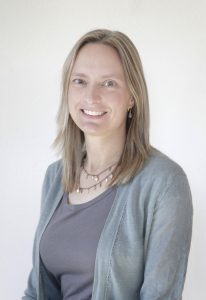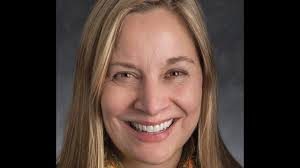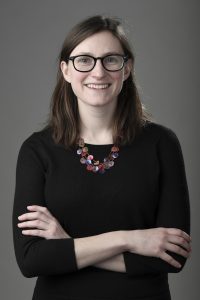22 August 2019
WASHINGTON – Journalists Alexandra Witze, Ann Gibbons and Sarah Kaplan have been awarded top honors from AGU for their reporting in the Earth and space sciences.
AGU recognizes freelance journalist Alexandra Witze with the 2019 Robert C. Cowen Award for Sustained Achievement in Science Journalism. Ann Gibbons, contributing correspondent at Science magazine, receives the 2019 David Perlman Award for Excellence in Science Journalism – News for her story about the worst year to be alive. Sarah Kaplan, reporter at The Washington Post, is honored with the 2019 Walter Sullivan Award for Excellence in Science Journalism – Features for an in-depth story chronicling NASA’s decision about where to search for life on Mars.
Robert C. Cowen Award for Sustained Achievement in Science Journalism
Cowen award winner Alexandra Witze has been writing about Earth science for nearly 25 years at major newspapers, for highly regarded magazines and as a book author. The Robert C. Cowen Award commends a journalist for “significant, lasting, and consistent contributions to accurate reporting or writing on the Earth and space sciences for the general public.” The Cowen award, named for the longtime science editor (now retired) of The Christian Science Monitor, is given no more often than every other year. Award recipients receive a glass globe on a pedestal.
Witze began her career in 1995 as an associate editor at Earth magazine and quickly moved to the Dallas Morning News. In 2005, Witze became chief of correspondent for the journal Nature. In 2010, Witze became a freelancer, and her work began to appear regularly in magazines including Knowable Magazine and Air & Space, as well as in Science News and Nature, where she remains a correspondent. In 2015, she published a book with her husband, Jeff Kanipe, about the 1783 eruption of the volcano Laki in Iceland.
Witze’s career has taken her around the world to write about geoscience – from NASA’s Jet Propulsion Laboratory to cover the Mars Pathfinder landing to the North Pole to cover climate science to China to cover the 2008 Sichuan earthquake to the Mauna Kea observatory to search for exoplanets. Her stories not only captivate readers and cover a wide range of geoscience subjects, but also highlight the societal importance of Earth science research.
“Alex has a sustained record of writing substantive and well-researched articles for well-reputed newspapers as well as science journals that are accessible and of interest to a broad audience,” the Cowen award selection committee noted. “With her deep expertise in geosciences, planetary sciences and astrophysics coupled with her captivating writing style, she is one the finest science writers at the current time.”
Witze has garnered numerous awards for her work, including AGU’s Walter Sullivan Award in 2000 and AGU’s Perlman Award in 2016, making her the only journalist to have won all three of AGU’s journalism awards. Her work has also been recognized by American Association for the Advancement of Science, the American Institute of Physics and the American Astronomical Society. Island on Fire: The Extraordinary Story of a Forgotten Volcano That Changed the World was supported by a journalism fellowship from the European Geosciences Union and was short-listed for the PEN/E.O. Wilson Literary Science Writing Award.
The Cowen award committee also noted Witze’s support of the science writing community. She serves on the board of directors and as treasurer of the National Association of Science Writers. She also sits on the board of The Open Notebook, an indispensable online resource for science journalists, and has been a mentor for TON’s early-career fellows.
David Perlman Award for Excellence in Science Writing – News
Perlman award winner Ann Gibbons is recognized for “Eruption made 536 ‘the worst year to be alive’” published in Science magazine on 15 November 2018. The David Perlman Award, named for the retired San Francisco Chronicle science editor, recognizes excellence in science news writing published with deadline pressure of one week or less. The award comes with a $5,000 prize and a plaque.
The winning article was inspired by a dinner conversation with a scientist in which Gibbons asked an interesting question – what did he think had been the worst year to be alive? – and got an unexpectedly definitive answer: 536. The article first describes the human toll of a “mysterious fog” that plunged parts of Europe, Asia and the Middle East into darkness in 536, leading to crop failures and starvation and followed by plague that hastened the collapse of the Roman Empire. Then comes the news: An ultraprecise study of ice from a Swiss glacier had nailed down the timing of three massive volcanic eruptions between 536 and 547 that had blocked out the sun, as well as a spike in lead pollution a century later that signaled the resumption of silver smelting and a rebounding economy.
The Perlman award selection committee noted that the tale is crisply told, with strong quotes and just the right level of detail explaining the chemical fingerprints of the eruptions, how this work built on previous studies and how it tied in with evidence from other AGU disciplines about this dark period in history. One committee member noted that “the title of the article sucked the reader in from the start, and the really nicely written story didn’t disappoint. I particularly appreciated the author’s good use of quantitative facts throughout, ensuring the science was well communicated without detracting from the narrative.” The committee also noted that the story was supported by excellent graphics, is truly original and required substantial digging. The winning article also showcases AGU sciences and is especially relevant as humanity confronts today’s climate crisis, the committee said.
“Ann began with a creative approach and executed it superbly,” one committee member wrote. “In the process she clearly presented volcanology and some very real human impacts in a manner that epitomizes the goals of the David Perlman Award.”
Finalists for this year’s Perlman Award include: Sandi Doughton, science reporter for The Seattle Times, for “A ‘landslide observatory’,” published in The Seattle Times on 14 February 2018; and Shannon Hall, freelance journalist, for “A New World’s Extraordinary Orbit Points to Planet Nine,” published by Quanta Magazine on 15 May 2018.
Walter Sullivan Award for Excellence in Science Journalism – Features
Sarah Kaplan receives the 2019 Walter Sullivan award for “Next stop, Mars,” which appeared in The Washington Post on 16 November 2018. The Water Sullivan Award, named for the late New York Times science writer, honors excellence in science feature writing for work prepared with a deadline of more than one week. The award comes with a $5,000 prize and a plaque.
The winning story chronicles NASA’s decision about where to search for life on Mars. The article centers on a three-day workshop held in Los Angeles in October 2018 where scientists debated which of three sites the Mars 2020 rover should explore for signs of past life on the Red Planet. Reporting from the workshop, Kaplan systematically lays out the arguments for and against each site. Threaded through the debates are ideas from biology, geology, and planetary science, which Kaplan explains clearly without sacrificing the complexity of the core scientific concepts. The article also includes a series of well-chosen, high-quality illustrations and graphics that accompany the writing. While the article focuses on the scientific issues central to the debate, it also reveals the human drama that is part of major scientific endeavors.
The committee was unanimous in praising the way the article deftly portrays the scientific decision-making process, with one member noting that it “makes the science come alive and puts readers into the process of choosing among three sites for the search for life on Mars.” Committee members cited the story’s sense of drama that made it highly original and set it apart from other entries. Committee members also noted the exceptional, compelling writing and clear explanations of the underlying science. One member wrote that “Kaplan pulled off the rare feat of writing a piece that is both exciting and instructive for the general reader.” By the end of the article, readers feel the weight of the decision that sits on the shoulders of NASA leadership.
“This piece was a huge joy to read,” one committee member noted. “Providing the historic perspective and in particular how much of scientific decisions just depend on human characters, made it outstanding.”
Finalists for this year’s Sullivan Award include: Tony Bartelme, special projects reporter at The Post and Courier (Charleston, S.C.) for “Into the Gulf Stream” published by The Post and Courier on 5 September 2018; Leah Crane, reporter at New Scientist, for “Return to Titan” published by New Scientist on 21 March 2018; Freelance journalist Kevin Krajick for “The Scientific Detectives Probing the Secrets of Ancient Oracles” published by Atlas Obscura on 17 May 2018; and Freelance journalist Julia Rosen for “The Carbon Harvest” published by Science magazine on 15 February 2018.
The three AGU journalism awards will be formally presented during AGU’s annual Honors Ceremony on Wednesday, 11 December 2019, as part of the 2019 AGU Fall Meeting in San Francisco.
###
Founded in 1919, AGU is a not-for-profit scientific society dedicated to advancing Earth and space science for the benefit of humanity. We support 60,000 members, who reside in 135 countries, as well as our broader community, through high-quality scholarly publications, dynamic meetings, our dedication to science policy and science communications, and our commitment to building a diverse and inclusive workforce, as well as many other innovative programs. AGU is home to the award-winning news publication Eos, the Thriving Earth Exchange, where scientists and community leaders work together to tackle local issues, and a headquarters building that represents Washington, D.C.’s first net zero energy commercial renovation. We are celebrating our Centennial in 2019. #AGU100
Nanci Bompey
+1 (202) 777-7524
[email protected]


